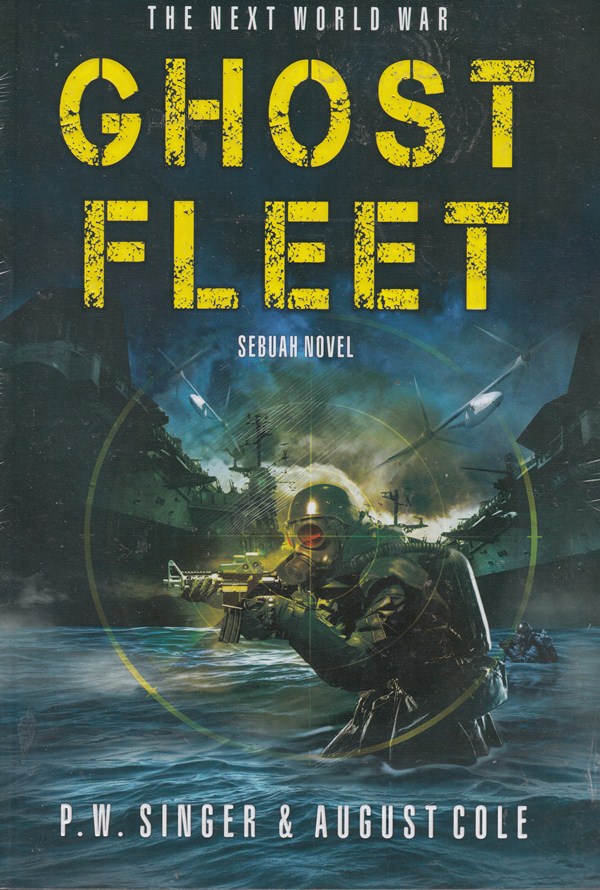An Executive Summary of Ghost Fleet by P.W. Singer and August Cole
It is not the strongest of the species that survives, nor the most intelligent. It is the one that is most adaptable to change.
Charles Darwin
Instituted by the alarming pace of developing weaponry and global strategy, leading US Defence thinkers P.W. Singer and August Cole describe plausible Third World War scenarios in their novel Ghost Fleet. Although officially science-fiction, Ghost Fleet is used by the authors to highlight the complex realities of future warfare between China, Russia and the United States. For ADF junior officers, Ghost Fleet raises an extraordinary scenario whereby Indonesia becomes a failed state, and our nation’s sea lanes are cut off by China’s powerful navy.
The Utility of Ghost Fleet for Junior Officers
As warfare continues to modernise, some nations will obtain capabilities that present a disproportionate threat to joint force operations. These, include highly sophisticated weapon systems that provide operational advantages. In Ghost Fleet, however, the most significant impacts of emerging technology are realised at the tactical level. The book highlights that rapid developments in the areas of Command, Control, Communications, Computing, Intelligence, Surveillance and Reconnaissance (C4ISR) will provide the adversary an overwhelming advantage in battlespace situational awareness. While the ADF’s technology will enable the Future Force a cross-cutting warfighting function of Command and Control; the scenarios posed by the authors highlight that our increased capability of networked command systems will be balanced by the corresponding growth in the enemy’s ability to disrupt or degrade those networks.
By reading Ghost Fleet, junior officers can be encouraged to mentally prepare themselves and their soldiers for operating in a congested and contested future operating environment (FOE). While this is already an acknowledged fact by most junior officers, P.W Singer and August Cole use this book to truly grip the imagination about what is possible, and just how complex the next fight could become. Ghost Fleet will remind junior officers of the necessity to embed contingency planning and habitual survivability practices into their daily training regimens.
The use of novels as an alternative method for PME is not limited to junior officers. As mentors of our junior officers, senior officers of our organisation must appreciate and emphasise the benefits that capturing the imagination will have for the current and future ADF. When considering the FOE, senior leaders will consider the strategic circumstances and settings in which decisions will be made, and the actions likely to be taken by friends and adversaries alike. For these leaders, reading Ghost Fleet will enhance their appreciation of the need to implement technological innovations, and more specifically focus on how to protect against them. Their enhanced awareness for further ADF considerations will filter down to junior leaders, who can further broadcast the relevance of this style of PME to their subordinates and beyond.
For those ‘subordinates and beyond’, we look to the operational essence of the ADF’s sub-units; Junior Non-Commissioned Officers (JNCOs). In contrast to our Senior Leaders, our JNCOs are at the forefront of applied innovation and adaptations to the future force. Their advantage in reading science-fiction is the professional development of refining their skills to adapt to the FOE presented in these novels. Their heightened respect for the principles of defence, or considerations made during their individual appreciation processes will increase survivability and the lethality of their team and ultimately the ADF.
The relevance of Science-Fiction in PME
As members of the profession of arms, we must ensure that we are consistently developing our understanding of the FOE. Reading an imaginative description for a future conflict may help the reader to appreciate the confronting complexities of technological weaponry before ever having to defeat it on the battlefield. We can observe a shift in priorities on the part of the ADF and Australian policymakers, who are spending more money on science and technology than ever before. Science-fiction draws on exciting narratives to entice the reader to finish the novel, which can be absent for Defence publications or historical texts. Officers across all branches of the ADF should look to leverage this awareness as a way to reliably integrate science-fiction as a means to enable critical thinking for the future of warfare. Science-fiction is an opportunity for military members to take an intellectual break from the stern nature of traditional doctrine or professional writing. Novels such as Ghost Fleet will allow readers to be inspired about how our world will be influenced by the technologies of tomorrow, and should form part of every military officer reading program.
Review by Alexander Beavan
Alexander Beavan is an artillery officer posted to the 1st Regiment, RAA. Alexander has maintained a watchful interest on developing weaponry and global strategy, and is always looking for useful ways of encouraging critical thinking. In his own time, he enjoys woodworking, long range target shooting, reading and learning to cook as a couple’s activity of a night time.

